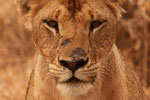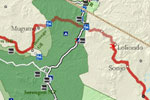
Lion with kill in the Serengeti ecosystem. Photo by: Rhett A. Butler.
In the effort to protect the Serengeti—arguably Africa’s most famous ecosystem—one of the major problems is the bushmeat trade. Population growth, little available protein, poverty, and a long-standing history of hunting has led many communities to poach wildlife within Serengeti National Park. Interviewing over a thousand community members in the western Serengeti, scientists found that community members are largely aware that wildlife hunting is illegal and that conservation of wild species is important, but hunt animals anyway partly out of necessity.
“Communities in western Serengeti are involved in wildlife hunting not because they lack knowledge about the illegality of wildlife hunting and the importance of conservation of wildlife species, but because they lack alternative sources of meat,” the researchers write in the new study in mongabay.com’s open access journal Tropical Conservation Science. They further note that despite promises, local communities find little economic gain from the park.
Hunting by permit is legal in parts of Serengeti National Park, but the researchers write that local communities avoid legal hunting because the price is far too high. Most legal hunters in the region are foreign trophy hunters.
“They are neither able to afford licensing fees nor allowed to use traditional weapons under the current legislation,” the researchers write. “In reality, legal hunting is not an option for local people in areas like Serengeti, since no hunting quotas are granted to local people at affordable terms. For local hunters, the economic benefits from sales of illegally acquired bush meat are far greater than the costs associated with a low probability of arrest and prosecution. The result is a persistent problem for wildlife conservation.”
In order to mitigate poaching by local communities, the researchers recommend programs and initiatives to diversify incomes, reduce poverty, increase food security, and provide better wildlife and conservation education in the western Serengeti.
CITATION:Bitanyi, S., Nesje, M., Kusiluka, L. J. M., Chenyambuga, S. W. and Kaltenborn, B. P. 2012. Awareness and perceptions of local people about wildlife hunting in western Serengeti communities. Tropical Conservation Science Vol. 5(2):208-224.
Related articles
Legal case against Serengeti road moves forward
(03/21/2012) A regional case against the construction of a proposed road through Serengeti National Park has moved to trial after a judge with the East African Court of Justice (EACJ) threw out concerns by Tanzania reports the Daily Nation. The government of Tanzania has proposed a controversial highway that would bifurcate the northern part of the Serengeti National, only to see their plans stalled by a lawsuit filed by the Kenyan-based NGO, Africa Network for Animal Welfare (ANAW), which argues that the road could have massive consequences for the entire Serengeti ecosystem, a view shared by many scientists.
Richard Leakey: ‘selfish’ critics choose wrong fight in Serengeti road

(07/02/2011) The controversial Serengeti road is going ahead, but with conditions. According to the Tanzanian Minister for Natural Resources and Tourism, Ezekiel Maige, the road will not be paved and it will be run by the Tanzanian park authority who will have the power to monitor traffic to ‘ensure no harm comes to the wildlife population’. Critics argue that even an unpaved road would eventually cripple the largest land migration in the world. However, famed Kenyan conservationist, ex-politician, and anthropologist, Richard Leakey, told mongabay.com that critics of the road are focusing on the wrong fight while failing to respect Tanzania’s right to develop. Leakey says that instead of attempting to stop the road from being built, which he believes is inevitable, critics should instead focus on funding a truly wildlife-friendly road.
Unpaved road through Serengeti to progress

(07/02/2011) After a week of confusion, the Tanzanian government has finally clarified its position on the hugely-controversial Serengeti road. The Minister for Natural Resources and Tourism, Ezekiel Maige, confirmed that a paved highway will not be built through the northern Serengeti National Park, however the government is still planning to construct a gravel road through the park. Yet critics have long warned that even an unpaved road would open Pandora’s box: eventually commercial and population pressure would push the road to be paved, widened, and fenced leading to a collapse of the world’s largest remaining-and most famous-land migration. Two million wildebeest, zebra, and Thomson’s gazelle pass along this route in annual migration from Tanzania to Kenya.
How do tourists view the Serengeti?
(06/27/2011) Serengeti National Park in Tanzania, an immense expanse of East African savanna, is a world famous tourist destination because of its plentiful megafauna, particularly the great migrating herds of wildebeest. Yet despite huge visitor numbers and the annual revenue of millions of US dollars, local poverty and increasing population continue to imperil the reserve. A new study in mongabay.com’s open-access journal Tropical Conservation Science found that while tourists to the Serengeti overall report a high degree of satisfaction with their trip, they are concerned about the future of the ecosystem.







